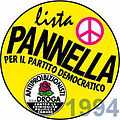Pannella List
| Pannella List | |
|---|---|
 | |
| Leader | Marco Pannella |
| Founded | 1992 |
| Dissolved | 1999 |
| Preceded by |
Radical Party (1955–89) Antiprohibitionists on Drugs (1989) |
| Succeeded by | Bonino List (since 1999) |
| Newspaper | Radio Radicale (FM radio) |
| Ideology |
Radicalism Liberalism Economic liberalism |
| National affiliation |
Pole of Freedoms (1994–96) Pole of Good Government (1994–96) |
|
Politics of Italy Political parties Elections | |
Pannella List (Lista Pannella) was a libertarian electoral list active in the 1990s in Italy. Its long-standing leader and standard-bearer was Marco Pannella, who had been the historical leader of the Radical Party (PR) from 1963 to 1989.
When the PR was transformed into Transnational Radical Party, a NGO working at the UN level and coordinating the efforts of several national parties and groupings mainly in support of human rights, in 1989, the Italian Radicals were free to join the party of their choice. Several party activists joined the Rainbow Greens (Francesco Rutelli, Adelaide Aglietta, etc.), others launched Yes Referendum (Marcello Pera, Massimo Teodori, etc.), while the bulk of them joined Pannella and organized themselves into the Pannella Clubs' Movement. This group presented itself in Italian elections from 1992 to 1999 ilists including Pannella's name: Lista Pannella, Lista Pannella-Rifomatori, Lista Pannella-Sgarbi, etc.
Pannella List made its first appearance in the 1992 general election, winning 1.2% of the vote, while Yes Referendum stopped at 0.8%. The PR had historically been considered a left-libertarian political movement in Italy (often proposing itself as the most extreme opposition to the Italian political establishment), but, when Silvio Berlusconi entered the political arena in 1994, Pannella decided to support his policies (meant to introduce libertarian economical principles), albeit critically and without becoming directly involved in his centre-right governmental cabinets, in the hope of a "liberal revolution" as opposed to the conservative and statist political establishment represented both by established centre-right and centre-left parties.
In the 1994 general election Pannella List won 3.5% of the vote (despite not being present in some key regions), 6 deputies and 2 senators, all elected thanks to an alliance with Berlusconi's Forza Italia party. The twisted relationship between the Radicals and Berlusconi, whose allies included social-conservative groups opposed to the Radicals, soon ended.
The Pannella List was replaced by the Bonino List since the 1999 European Parliament election. The new list was named for Emma Bonino, a leading Radical who had been member of the European Commission from 1995 to 1999 (appointed by Berlusconi), after the unsuccessful "Emma for President" campaign.